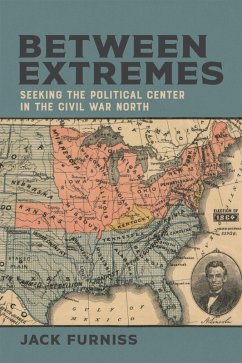Between 1861 and 1865, northern voters fortified Abraham Lincoln's administration as it oversaw the end of the institution of slavery and an unprecedented expansion in the size and scope of the federal government. Since the United States never considered suspending the democratic process during the Civil War, these revolutionary developments-indeed the entire war effort-depended on ballots as much as bullets. Why did civilians who, at the start of the conflict, had not anticipated or desired these transformations to their society nonetheless vote to uphold them? Jack Furniss's Between Extremes proposes an answer to this question by revealing a potent strand of centrist politics that took hold across the Union and provided the conservative rationales that allowed most northerners to accept the war's radical outcomes.
Dieser Download kann aus rechtlichen Gründen nur mit Rechnungsadresse in A, D ausgeliefert werden.









